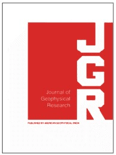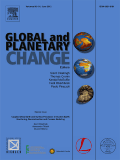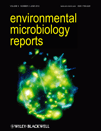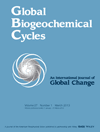
Journal of Geophysical Research-Biogeosciences
Scope & Guideline
Bridging Science and Action for Global Environmental Challenges.
Introduction
Aims and Scopes
- Biogeochemical Cycles:
Research on the cycling of nutrients and elements (like carbon and nitrogen) through different ecosystems, examining how these cycles are influenced by environmental changes. - Ecosystem Responses to Climate Change:
Studies investigating how ecosystems respond to climate variability and extreme weather events, including changes in productivity, composition, and biogeochemical processes. - Aquatic and Terrestrial Interactions:
Exploration of the connections between terrestrial and aquatic ecosystems, including the fluxes of carbon and nutrients between these domains. - Remote Sensing and Modeling:
Utilization of remote sensing technologies and modeling approaches to assess and predict ecosystem dynamics and biogeochemical processes on various scales. - Microbial Ecology:
Investigations into the roles of microbial communities in nutrient cycling, organic matter decomposition, and their responses to environmental stressors. - Land-Use and Management Effects:
Research on how different land-use practices and management strategies impact ecosystem services, carbon storage, and nutrient dynamics.
Trending and Emerging
- Climate Change Adaptation and Resilience:
An increasing focus on understanding how ecosystems adapt to climate change, including resilience mechanisms and strategies for mitigation. - Integration of Remote Sensing with Ground Observations:
The trend towards combining remote sensing data with ground-based observations to enhance the accuracy of ecological assessments and improve modeling efforts. - Microbial Contributions to Biogeochemical Processes:
A growing emphasis on the role of microbial communities in driving biogeochemical cycles, particularly in relation to carbon and nutrient cycling. - Impact of Land Use Change on Ecosystem Functions:
Research exploring the effects of land use changes on ecosystem services, nutrient dynamics, and greenhouse gas emissions is gaining traction. - Emerging Contaminants and Ecosystem Health:
An increasing interest in the effects of emerging contaminants (like pharmaceuticals and microplastics) on ecosystem health and biogeochemical processes. - Machine Learning in Environmental Sciences:
The utilization of machine learning and artificial intelligence techniques to analyze large datasets and improve predictions related to biogeochemical processes and ecosystem dynamics.
Declining or Waning
- Traditional Soil Chemistry Studies:
There seems to be a waning interest in classical soil chemistry studies that do not incorporate biological interactions or broader ecological implications. - Single-Factor Analyses:
Research focusing solely on single environmental factors (e.g., temperature or moisture) without considering the complex interactions in ecosystems is becoming less common. - Historical Ecology Studies:
Investigations that rely heavily on historical data without integrating modern methodologies or ecological modeling are appearing less frequently. - Static Ecosystem Models:
There is a noticeable decline in the use of static models that do not account for dynamic changes in ecosystems, as researchers increasingly prefer more adaptable and responsive modeling approaches. - Studies on Isolated Ecosystems:
Research focused exclusively on isolated ecosystems without considering their connectivity and interactions with surrounding environments is becoming less prevalent.
Similar Journals

GLOBAL AND PLANETARY CHANGE
Unraveling the Complexities of Planetary ChangeGLOBAL AND PLANETARY CHANGE, published by Elsevier, is a premier international journal focused on the critical issues surrounding environmental science, climate change, and planetary dynamics. Since its inception in 1989, this journal has established itself as a leading voice in the field, currently holding a prestigious Q1 ranking in both Global and Planetary Change and Oceanography as of 2023. With a remarkable influence reflected in its Scopus rankings—15th in Earth and Planetary Sciences and 34th in Global and Planetary Change—it serves as an essential platform for researchers, professionals, and students. The journal provides a comprehensive examination of cutting-edge research findings and innovative developments that address the urgent challenges facing our planet. Although it is not an Open Access journal, it remains a vital resource for anyone keen to contribute to or stay informed on the ever-evolving discourse of global environmental change, promoting sustainable solutions for the future.

Environmental Microbiology Reports
Advancing Knowledge in Microbial Ecology and SustainabilityEnvironmental Microbiology Reports, published by WILEY, is a prestigious journal dedicated to the field of environmental microbiology, exploring the intricate interactions between microorganisms and their environments. With an ISSN of 1758-2229, this journal has established itself as a crucial resource for researchers, professionals, and students interested in the latest advancements and applications in microbial ecology, soil science, and environmental sustainability. Since its inception in 2009, the journal has grown in impact and reputation, proudly ranked in the Q1 category for both Agricultural and Biological Sciences and Ecology, Evolution, Behavior and Systematics as of 2023. Notably, it occupies the 17th position out of 193 in its subcategory based on Scopus rankings, showcasing its significance within the field. Although it does not currently offer open access options, the high-quality research published in this journal continues to contribute significantly to the understanding of microbial roles in environmental processes, emphasizing the vital role of microbes in maintaining ecosystem health and promoting sustainable practices.

Frontiers in Marine Science
Connecting Science and Sustainability for Ocean HealthFrontiers in Marine Science, published by FRONTIERS MEDIA SA, stands as a leading open-access journal dedicated to advancing our understanding of marine ecosystems and their interconnectedness with global environmental systems. With a focus that spans a range of vital sub-disciplines including Aquatic Science, Oceanography, and Ocean Engineering, this journal has achieved prestigious rankings within the Q1 category in multiple areas as of 2023. The journal, thriving since its inception in 2014, promotes high-quality, peer-reviewed research that addresses critical challenges in marine and environmental science, making it an invaluable resource for researchers, professionals, and students alike. Located in Switzerland, Frontiers in Marine Science is committed to accessible scientific knowledge, boasting an impressive impact through a wide array of contributions from the global community. The journal's aim is to foster collaborative research efforts and innovative responses to the pressing issues facing our oceans and waterways today.

Earth System Dynamics
Unveiling Insights into the Earth's Dynamic SystemEarth System Dynamics is a premier academic journal dedicated to advancing our understanding of the intricate interactions within the Earth system, encompassing atmospheric, hydrological, geological, and biological processes. Published by COPERNICUS GESELLSCHAFT MBH in Germany, this Open Access journal has been fostering scholarly communication since its inception in 2010, allowing unrestricted access to vital research findings. With an impressive Impact Factor and a ranking of #7 out of 195 in the field of Earth and Planetary Sciences, as well as being categorized in the Q1 quartile, Earth System Dynamics stands at the forefront of its discipline. Researchers, professionals, and students alike benefit from its comprehensive scope, which covers various aspects of Earth system science and its implications for climate change and sustainability, making it an indispensable resource for anyone invested in the environmental challenges of our time. As the journal continues to converge remarkable insights up to 2024, contributors and readers alike are encouraged to engage with this vital ongoing conversation.

JOURNAL OF SOILS AND SEDIMENTS
Fostering Dialogue on Soil and Sediment SignificanceJOURNAL OF SOILS AND SEDIMENTS, published by SPRINGER HEIDELBERG, stands as a premier interdisciplinary platform dedicated to advancing the understanding of soil and sediment dynamics within the broader context of Earth sciences. With an impressive impact factor and a Q1 ranking in both Earth-Surface Processes and Stratigraphy, this journal not only reflects the high quality of research but also contributes significantly to the dialogue amongst researchers, professionals, and students in the field. The journal encompasses a wide spectrum of topics from sedimentology to soil science, making it essential reading for those involved in environmental management, agriculture, and geology. Access options are available to ensure that cutting-edge research is accessible to a global audience, reflecting the journal's commitment to fostering collaboration and innovation. As we converge towards 2024, JOURNAL OF SOILS AND SEDIMENTS aims to continue its role in shaping scientific inquiry and policy formulation concerning the vital roles of soils and sediments in ecological and geological systems.

GLOBAL BIOGEOCHEMICAL CYCLES
Bridging science and policy for environmental impact.GLOBAL BIOGEOCHEMICAL CYCLES, published by the American Geophysical Union, is a leading journal in the field of geochemistry that has gained significant recognition since its inception in 1987. With an impressive impact factor and a Q1 ranking in multiple categories such as Atmospheric Science, Environmental Chemistry, and Global and Planetary Change, it serves as a crucial platform for the dissemination of high-quality research. This journal emphasizes interdisciplinary studies focusing on biogeochemical processes and their implications for global environmental change, attracting contributions from a diverse range of scientific communities. Researchers, professionals, and students engaged in atmospheric sciences, environmental chemistry, and planetary sciences will find invaluable insights and state-of-the-art methodologies within its pages. GLOBAL BIOGEOCHEMICAL CYCLES continues to advance our understanding of the Earth’s systems, thus holding a pivotal position in shaping future environmental policies and sustainability efforts.

Forest Ecosystems
Connecting research to conservation efforts.Forest Ecosystems is a prestigious open access journal published by KEAI PUBLISHING LTD, dedicated to advancing knowledge in the fields of forestry, ecology, and conservation. Established in 2014 and located in Beijing, China, this journal has rapidly gained prominence, achieving Q1 status in multiple categories, including Ecology, Evolution, Behavior and Systematics, and Forestry in 2023. With an impressive rank of 19 out of 174 in the Scopus category of Agricultural and Biological Sciences - Forestry, it stands in the 89th percentile, reflecting its influential contributions to the field. The journal fosters scholarly discourse and disseminates innovative research aimed at understanding forest ecosystems and their vital role in our environment. Offering a robust platform for researchers, professionals, and students, Forest Ecosystems ensures accessibility through its open access format, enabling a wider audience to engage with and benefit from cutting-edge research dedicated to the stewardship of forest resources.

ECOLOGICAL RESEARCH
Connecting researchers to shape the future of ecological science.ECOLOGICAL RESEARCH is a prestigious academic journal published by WILEY, dedicated to advancing the field of ecology and its associated disciplines. Since its inception in 1986, the journal has consistently provided a platform for high-quality, peer-reviewed research, contributing significantly to the understanding of ecological systems and their complexities. With an impressive 2023 impact factor reflected in its Q1 ranking in the category of Ecology, Evolution, Behavior, and Systematics, it stands among the top journals in its field, as evidenced by its Scopus rank of #192 out of 721 and placement in the 73rd percentile. While accessible through standard subscription models, this journal plays an essential role in disseminating crucial findings and innovative methodologies to researchers, professionals, and students alike. With a commitment to fostering ecological knowledge and collaboration, ECOLOGICAL RESEARCH continues to influence ecological practices and policies, shaping the future of research in this critical area.

Limnology and Oceanography Letters
Advancing knowledge in aquatic ecosystems.Limnology and Oceanography Letters, published by WILEY, is an esteemed peer-reviewed journal dedicated to advancing our understanding of freshwater and marine systems. With an impressive Q1 ranking in both Aquatic Science and Oceanography, this journal has established itself as a pivotal resource for researchers, professionals, and students alike. Since its inception as an Open Access journal in 2016, it has provided unrestricted access to high-quality, innovative research articles that illuminate diverse aspects of aquatic ecosystems and their dynamics. With a publication history from 2016 to 2024 and a significant presence in Scopus rankings—placing it in the top 6% for Oceanography and the top 8% for Aquatic Science, this journal not only fosters scholarly communication but also encourages interdisciplinary collaboration. Addressing pressing issues related to water resource management, climate impact, and ecological integrity, Limnology and Oceanography Letters remains essential for those dedicated to the science of aquatic environments.

JOURNAL OF OCEANOGRAPHY
Exploring the Depths of Marine ScienceJOURNAL OF OCEANOGRAPHY, published by Springer, stands as a leading academic journal in the field, with an impressive Q1 ranking in Oceanography for 2023. Since its inception in 1992, this journal has dedicated itself to the dissemination of high-quality research that spans a diverse array of topics within oceanography and earth sciences. With an ISSN of 0916-8370 and an E-ISSN of 1573-868X, it plays a crucial role in bridging the gap between academia and practical marine applications. The journal is indexed in Scopus, ranking #57 out of 145 in its category, reflecting its rigorous academic standards and the impact of its published works, reaching a notable ile in the 61st percentile. Located in Japan, the JOURNAL OF OCEANOGRAPHY provides a vital platform for sharing significant research findings that contribute to our understanding of marine environments, aiming to foster interdisciplinary collaboration among researchers, professionals, and students dedicated to marine science.